+ By Desiree Smith-Daughety + Photos by Emily Karcher Schmitt
Raids. Tear gas.
Police corridor.
These are just a few highlights culled from the many memorable experiences shared by the Jello Boys over the band’s 38-year history. It’s all part of the fun, which is the secret sauce to the band’s longevity, according to Steve Badger, one of the band’s founding members.
As to be expected over such a span of time, they’ve seen their share of ups, downs, additions, break-ups, and even death. Launched in 1981 as what Badger refers to as a basement band—they would meet in the basement of a friend’s parents’ house—they began entwining notes, harmonies, and lives. According to Badger, they graduated to playing “real gigs” rather than house parties by 1983, when Badger was invited to come out and play a show because he knew Grateful Dead songs. “By 1986 or so, everyone thought of us as a Dead cover band, although we would only play one or two Dead songs the whole night,” he says.
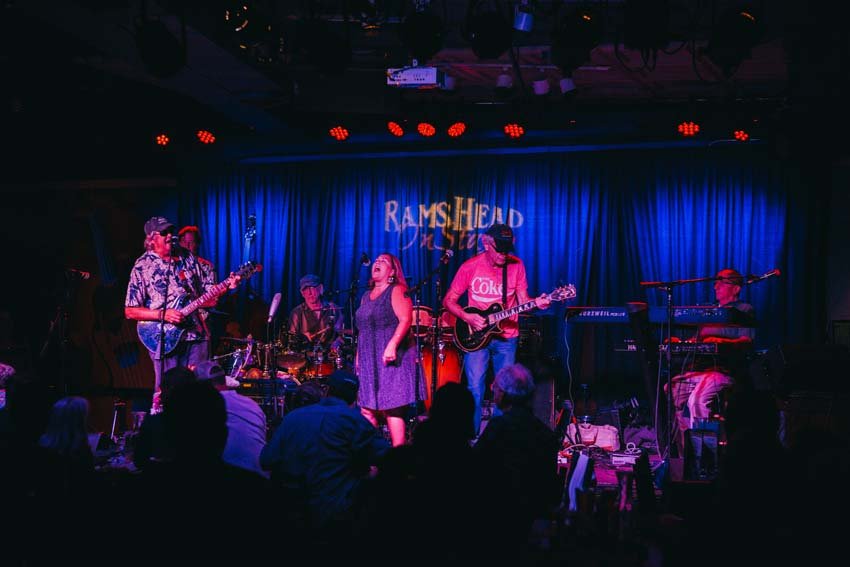
The band’s tagline is “spontaneous music for combustible people.” Badger describes the early days as “a couple Bohos playing guitar” before they added musicians, and it has been a wild ride from the start, beginning with the first gig, when the drummer went missing.
Actually, twice he went missing.
The first time, he’d fallen over while playing during the set. The second time, he experienced some sort of life epiphany and took off mid-set, spurred on by a nonmusician muse. (Years later, the band members learned he’d left the state to join the family business.) Over time, the group coalesced into a more consistent core made up of a drummer, a bass player, two guitar players, a keyboard player, and a lead singer.
The group’s original name was Bub and the Lightweights, but that soon changed. While playing at a house party one night, someone asked what the band’s name was. One partygoer said he thought it was the “mellow boys” because of the slow-moving tune the group was playing, but another man joked, “No, they’re the Jello Boys,” and the name stuck.

The Jello Boys count at least two main heydays during their years, with plenty of trials and tribulations in between. The first, 1984–1988, was with founding member Greg Gabor. During the second, 1989–1995, the band traveled to play gigs mostly in New York and throughout the Mid-Atlantic and once as far as Florida.
At one point, around 1992, the band discussed taking sabbaticals from day jobs to tour continuously, but because one band member was recovering from a heart valve procedure and the drummer’s hand was in a cast, the tour didn’t materialize. In 1995, the band considered a break when one member moved out of state, but musician Dean Rosenthal, whom Badger describes as being “a consistent friend to us,” asked the group to open for him at a Christmas Eve show. Badger recalls everyone dancing, inside and outside—even police officers. “We thought [that since] people still want to hear us play, maybe we should play some more,” he says. So the band continued. At its musical height, it pulled from a 300-song catalog of original and cover songs.
They grew a committed following that would travel to attend shows out of state. Some of the shows were big field parties with thousands attending, such as at Sudlersville Nursery in Sudlersville on the Eastern Shore, Wilmers Park in Brandywine, and others in Howard and Montgomery Counties. The crowds drew the attention of the keepers of law and order.

Says Badger of those times, “Rain and police were constants.” One show was raided by officers wielding shields and tear gas to disperse the crowds. They then formed a police corridor by which the band members were ordered to make their exit. When Gabor asked for the search warrant, an officer said, “Throw his crap out the window,” motivating the band to get moving. Badger recognized someone on his way along the blue gauntlet—an officer who docked his boat in Annapolis near Alley Cat, then Badger’s T-shirt shop. Badger later spoke with him and was advised that if he wanted to do shows that drew such large crowds, then he should get permission.
The road, coupled with the unscrupulous nature of some people, took its toll. Certain venue managers counted fewer attendees than what the band calculated, thereby cheating in the cover charge split. To confirm suspicions, the band had someone count heads at a show.
Thus, the Jello Boys found they weren’t having fun anymore. Everyone had day jobs, so there was no need to hassle with anyone to earn money through music. The group decided to switch gears and play benefits to help raise money for causes, and in later years began playing other venues again.

At one point, the Jello Boys couldn’t play Rams Head On Stage in Annapolis because the music propels people up onto their feet to dance; that didn’t work well in a sit-down venue where patrons would be blocking the servers’ ability to get around. According to Badger, Rams Head On Stage has begun offering a dance floor at select shows, and the Jello Boys can now be found headlining there on occasion.
The band’s current line-up includes Badger on rhythm guitar and vocals, Jimmy Jacobs on keyboards and vocals, Leslie Agre as lead vocalist, Russell Stone on lead guitar, Tom Fridrich on drums, Rurik Reshetiloff on electric bass, and Steve Wanbaugh on trumpet. Four of the band’s members write songs. They maintain a good following and play gigs such as the First Sunday Arts Festival in Annapolis— Badger loves looking out at people dancing in the street, across the street, and in the booths, as well as seeing people sing the band’s original songs. “It’s always a treat, and amazing,” he says.
The Jello Boys are still having fun and plan to continue sharing that with audiences for years to come. █
To learn more, visit www.facebook.com/The-Jello-Boys-86518157595.

Steve Wanbaugh warms up on the trumpet before the Rams Head Live show. Photo by Emily Karcher Schmitt 
A selection of the band’s favorite old photos and concert fliers. Photo by Emily Karcher Schmitt 
A selection of the band’s favorite old photos and concert fliers. Photo by Emily Karcher Schmitt 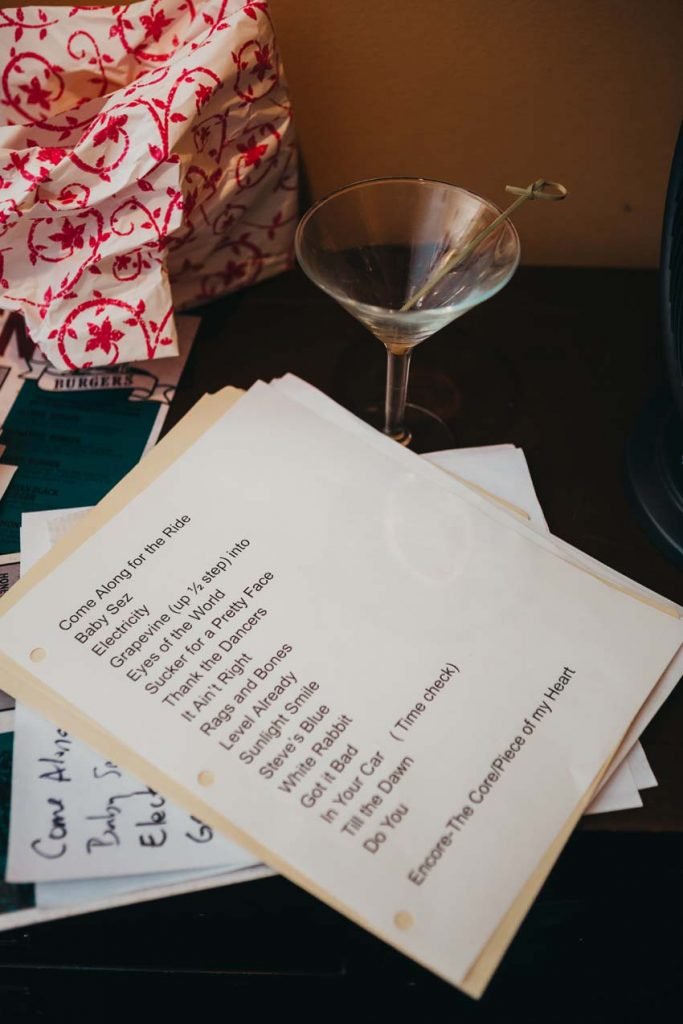
While the crowd pours into Rams Head Live, the set list gets reviewed one more time backstage in the green room. Photo by Emily Karcher Schmitt 
Steve Badger and Steve Wanbaugh at Rams Head Live in September. Photo by Emily Karcher Schmitt 
The band has a loyal and lively following with a packed house at Rams Head Live in September. Photo by Emily Karcher Schmitt 
Steve Badger sings wearing his trademark sunglasses. “I like to sing with my eyes closed,” he says. Photo by Emily Karcher Schmitt 
Leslie Agre voice is soulful and distinctive amidst the guitar rides and rock rhythms of The Jello Boys at Rams Head Live in Annapolis, September 2019. Photo by Emily Karcher Schmitt 
The band performs for a packed house of loyal fans at Rams Head Live in September 2019.Photo by Emily Karcher Schmitt 
Steve Badger sings wearing his trademark sunglasses. “I like to sing with my eyes closed,” he says. Photo by Emily Karcher Schmitt 
Leslie Agre sings lead vocals while the band plays one of their crowd pleasers during a show at Rams Head Live. In the background, part of the audience fills a dance floor, stage right. Photo by Emily Karcher Schmitt 
The band performs for a packed house at Rams Head Live. Photo by Emily Karcher Schmitt 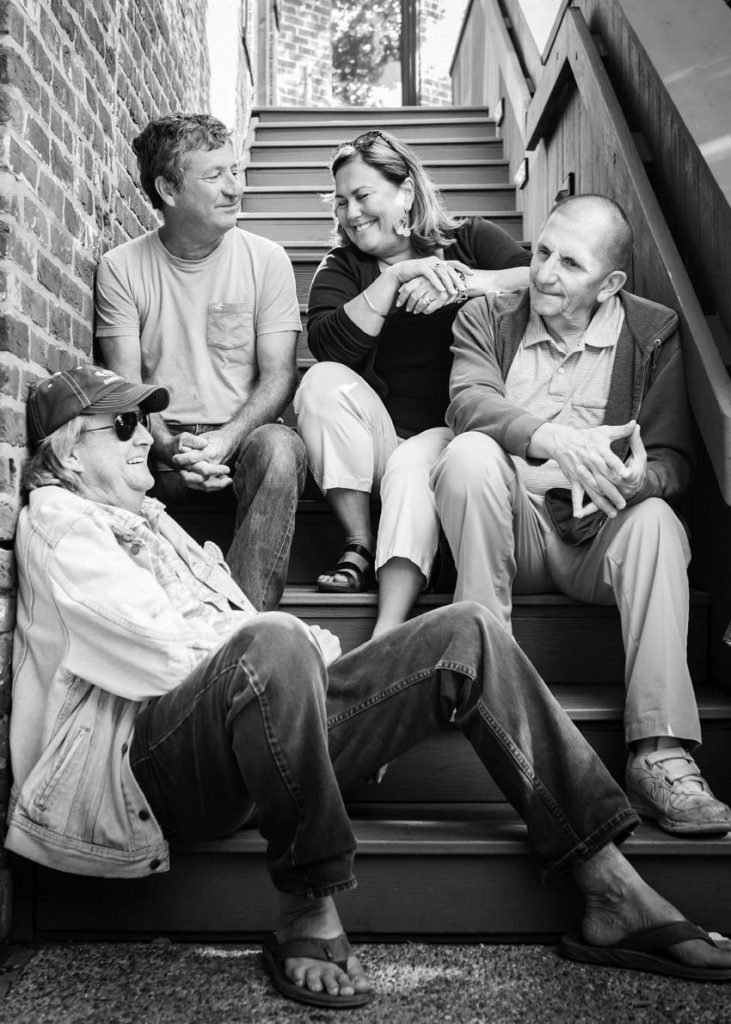
The four original band members crack jokes and reminisce about old times outside 49 West in Annapolis. Clockwise from left: Steve Badger (vocals, guitar), Rurik Reshetiloff (bass), Leslie Agre (vocals), Jim Jacobs (keyboard). Photo by Emily Karcher Schmitt 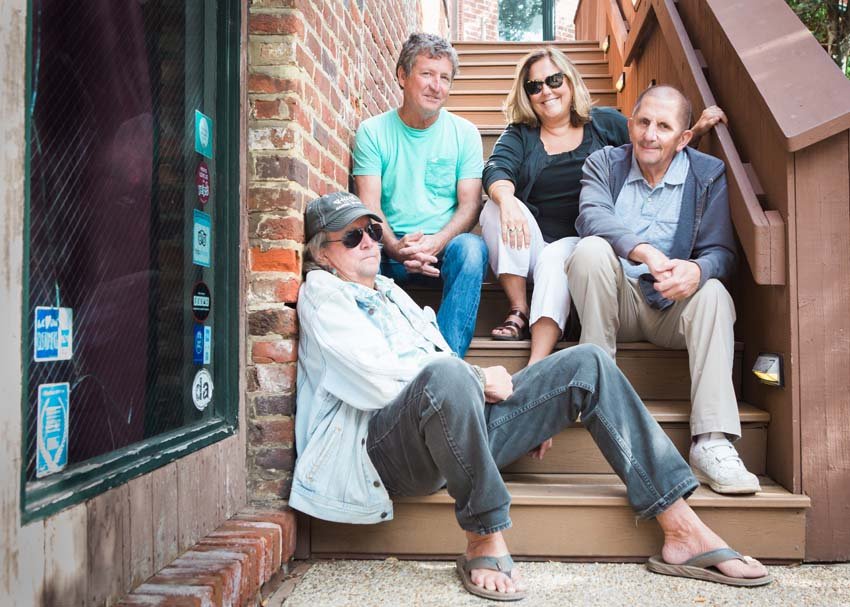
The four original band members sit outside 49 West in Annapolis, a venue where their spinoff bands (the Badger Band and the Solid Sender Trio) often perform. Clockwise from left: Steve Badger (vocals, guitar), Rurik Reshetiloff (bass), Leslie Agre (vocals), Jim Jacobs (keyboard). Photo by Emily Karcher Schmitt 
The band has such a loyal following, they’ve inspired paintings by local artists through the years, including this vibrant canvas. Photo by Emily Karcher Schmitt 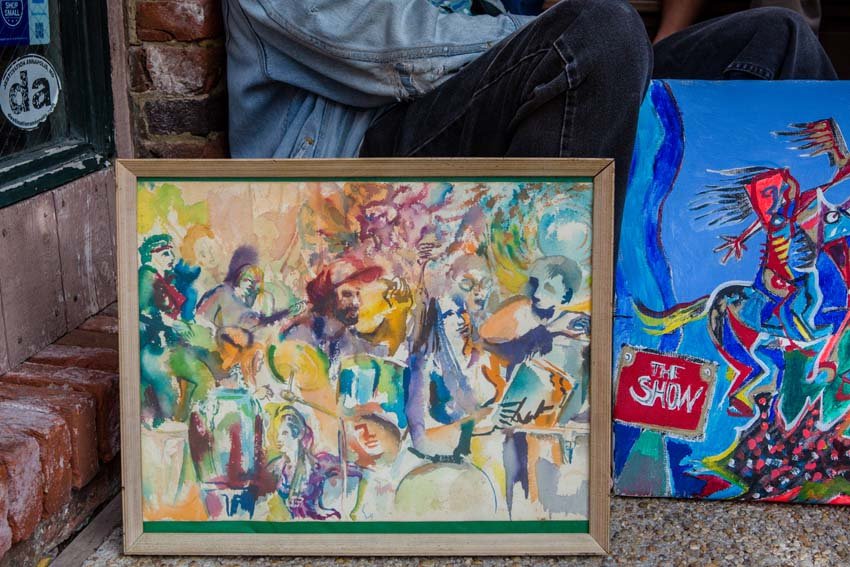
Loyal fans have been inspired to paint some of The Jello Boys’ performances, including this intricate watercolor and vibrant acrylic canvas. Photo by Emily Karcher Schmitt 
The four original band members gather outside 49 West in Annapolis. From L to R: Jim Jacobs, Leslie Agre, Rurik Reshetiloff, Steve Badger. Photo by Emily Karcher Schmitt 
The four original band members gather outside 49 West in Annapolis. From L to R: Jim Jacobs, Leslie Agre, Rurik Reshetiloff, Steve Badger. Photo by Emily Karcher Schmitt 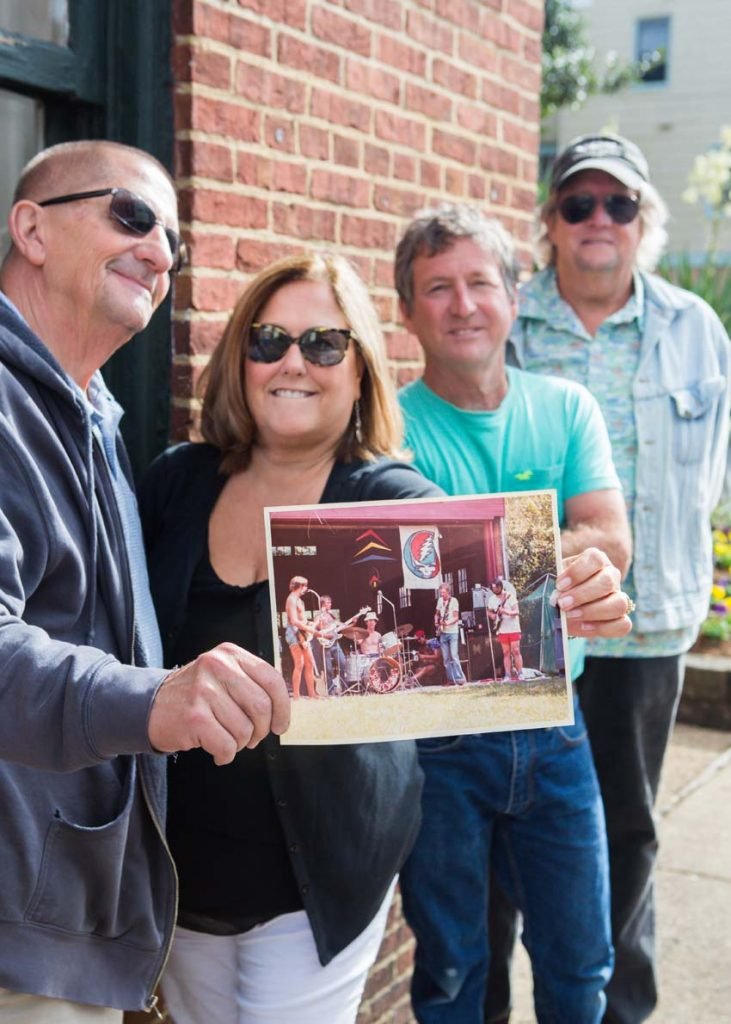
The four original band members show off an 80s era photograph of one of The Jello Boys’ performances. Photo by Emily Karcher Schmitt 
The band shows off a classic photograph of The Jello Boys from a different era, circa 1980s. Photo by Emily Karcher Schmitt 
The band shows off a classic photograph of The Jello Boys from a different era, circa 1980s. Photo by Emily Karcher Schmitt

